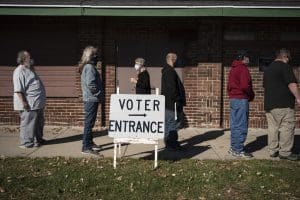16 states are pushing bills to purge voter rolls in latest voter suppression scheme
Former Attorney General Eric Holder said voter roll purges are a tactic of ‘movements to try to keep people away from the polls.’

Among the provisions of the hundreds of voter suppression bills GOP lawmakers in state legislatures across the country have introduced in the current session are measures that would mandate purges of names from voter rolls.
Measures expanding the purging voters from the rolls have been introduced in at least 16 states, according to the Brennan Center for Justice, and have already been signed into law in Utah.
The purges come in different forms. Some states are seeking to remove voters after they failed to vote in successive elections, while others want to remove names from lists of voters who had registered to receive an absentee ballot automatically for every election. Voting rights experts say even measures aimed at removing voters for legitimate reasons — such as death or disqualification — have serious flaws that could lead people who are eligible to vote to be disenfranchised.
“There are movements to try to keep people away from the polls, and purging people from voter registration rolls is one of the tactics that is unfortunately used too frequently,” former Attorney General Eric Holder said at a March 24 hearing of the Senate Rules and Administration Committee on S. 1, the “For the People Act,” which would institute government and election reforms and and block voter suppression efforts in the states..
On April 1, the Texas Senate passed a bill that would force naturalized American citizens to prove their citizenship status in order to vote.
It’s a retread of a failed move Republicans in the state attempted in 2019 to kick tens of thousands of eligible voters off the rolls using lies about noncitizens voting. A court blocked the move, and Texas was forced to admit that noncitizens were not registered to vote.
In February, Utah’s governor signed into law a measure that mandates county election clerks compare the names on death records with those on voting rolls and remove that are on both within 10 days.
The Brennan Center for Justice said the law makes “faulty purges more likely”: “Because the law does not require any notice to the voters being removed, does not require auditing of the source data, and does not specify how many data points must be matched, it creates a risk that county clerks will remove the wrong names from their voter registration rolls.”
Republican legislators are also working to remove names from permanent absentee voting lists.
Republicans in the Arizona Legislature introduced a bill that would make it possible to kick voters off of the state’s Permanent Early Voting List if they did not vote by mail in two consecutive election cycles. According to the Associated Press, about 75% of registered voters in the state are on the list, and about 200,000 would have been removed from the list in 2020 had this measure been in place.
Republicans in the Florida Senate are pushing for a similar measure that would force voters who opted to receive absentee ballots for the 2020 cycle to reapply for them for the 2022 midterm elections.
Voting rights experts have said for years that purges often lead eligible voters to be disenfranchised.
The Brennan Center said in a report released in 2019, “At least 17 million voters were purged nationwide between 2016 and 2018,” with “counties with a history of voter discrimination” seeing purges “at much higher rates than other counties. … Troublingly, minority voters are more likely to share names than white voters, potentially exposing them to a greater risk of being purged. Voters often do not realize they have been purged until they try to cast a ballot on Election Day — after it’s already too late.”
In 2019, Ohio almost purged from its voter rolls 40,000 people who were eligible to vote.
In 2000, Florida Republicans carried out a voter roll purge that wrongly removed tens of thousands of voters from the rolls by incorrectly labeling them as felons.
If it becomes law, the For the People Act would require states to obtain a voters’ “full name (including the voter’s middle name, if any) and date of birth, and the last 4 digits of the voter’s social security number,” or data on whether a person had actually moved before they could be purged from the rolls. It would also require that such checks be carried out at least six months before an election.
Published with permission of The American Independent Foundation.
Recommended

New NC GOP chair flirts with bogus stolen election conspiracies
Simmons predecessor was a staunch 2020 election denier
By Jesse Valentine - April 19, 2024
Texas activists pushed abortion restrictions in NM cities and counties, records show
Emails reveal influence and control in exchange for promises of legal help
By Austin Fisher, Source NM - March 04, 2024
Cannabis workers across Missouri begin push to unionize dispensaries
The first day was a breeze. Sean Shannon and Danny Foster walked into several marijuana dispensaries around Missouri with their matching “Union For Cannabis Workers” shirts and talked to employees about the possibility of unionizing. “The first day, there were 57 stops amongst the teams,” said Shannon, lead organizer with UFCW Local 655, which actually […]
By Rebecca Rivas - December 04, 2023









































































